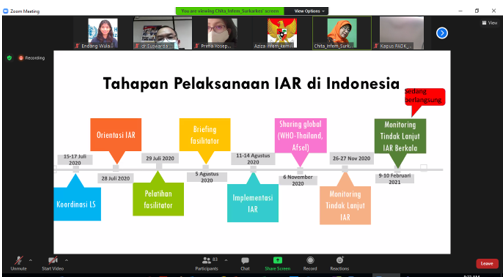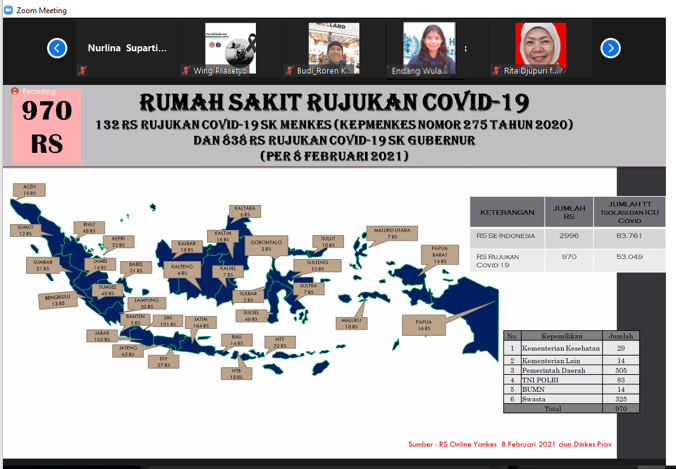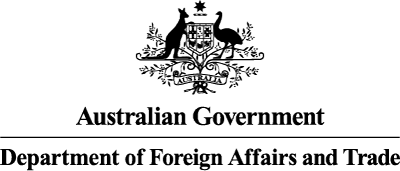The intra-action review (IAR) is a comprehensive multisectoral review to identify gaps and opportunities for learning from and improving the COVID‑19 response. Between 11-14 August 2020, WHO supported the Ministry of Health (MoH) to conduct the IAR that provided a set of recommendations covering the nine key pillars of COVID-19 response: 1) command and coordination; (2) risk communication and community empowerment; (3) surveillance, rapid response teams and case investigation; (4) points of entry, international travel, and transport; (5) laboratory; (6) infection control; (7) case management; (8) operational and logistics support and (9) maintaining essential health services and systems.

WHO facilitated a video conference to monitor the implementation of IAR recommendations
Photo Credit: Endang Wulandari/WHO
As a follow-up to the review, the MoH conducted the first monitoring of the implementation of IAR recommendations on 26-27 November 2020. On 9-10 February 2021, WHO supported the MoH to conduct the second monitoring meeting of the IAR recommendations. During this meeting, the participants discussed the nine IAR pillars and added a COVID-19 vaccination pillar.
A total of 98 participants attended the meeting, including the Presidential Office, Cabinet Secretary, National Disaster Management Agency (BNPB), Coordinating Ministry of Human Development and Culture, Ministry of Home Affairs, Ministry of Defence, professional organizations, Ministry of Information and Communication, Indonesia Food and Drug Authority (BPOM), point of entry officers, provincial health offices, hospitals, international organizations (including UNICEF, FAO, and OCHA), and other development partners (including USAID, DFAT, CDC).
MoH officials in charge of each pillar presented activities that have been implemented based on the recommendations and underlined the challenges and gaps. The meeting also highlighted a set of achievements. These included the revised COVID-19 health sector response plan, improvements in areas such as trainings on contact tracing and infection control, implementation of contact tracing reporting application (Silacak) to enhance contact tracing, expansion of laboratory network up to 612 laboratories and development of a vaccine deployment plan.
The risk communication pillar has improved coordination of different COVID-19 hotlines, such as Halo Kemenkes at MoH, COVID-19 hotlines 117 and 119, and the analysis of hotline data. Efforts in countering hoaxes have been strengthened, as a result of collaboration with key stakeholders, and continuous development of information, education and communication materials and dissemination through multiple media platforms.
The case management pillar highlighted the expansion of COVID-19 referral hospitals up to 970 referral hospitals with 51 898 beds, revised case management guidelines and training in collaboration with professional organizations.

The Ministry of Health presented the implementation of IAR recommendations on case management
Photo Credit: Endang Wulandari/WHO
The COVID-19 response at points of entry (PoE) continued to maintain the capacity to screen travellers, implement the guidelines for the arrival of international travellers, provide health quarantine facilities and resource mobilization to support the response at PoE. International travellers are required to complete e-Health Alert Cards. The provincial health officers have been given access to e-Health Alert Card data to enhance contact tracing and monitoring.
The COVID-19 Partners Platform has been used to support the planning, implementation and resourcing of response activities. The COVID-19 Partners Platform now has included information on funding from donors and partners, as well as COVID-19 national and provincial response plans for Papua, West Papua, North Sulawesi, South Sulawesi and North Maluku and vaccines deployment plans.
The meeting offered several new recommendations to further strengthen the national COVID-19 response:
- Disseminate the signed COVID-19 health sector response plan and support provinces to develop and monitor COVID-19 provincial response plans;
- Optimize the use of SISRUTE (integrated referral system);
- Improve completeness, verification and data analysis for COVID-19 report through New All Record (NAR), Silacak contact tracing, Silaphar daily reporting application, SIRS hospital information online system, and continuously improve the completeness and timeliness of reporting and data analysis;
- Weekly report monitoring of indicators of adjusting public health measures at district levels;
- Improve strategy and implementation for genomic surveillance by involving multisectoral stakeholders;
- Improve healthcare workers’ human resources management, including assigning healthcare workers to support ICU;
- Improve information on bed and ICU capacity for patient referrals and referral system;
- Conduct medical audits for healthcare workers infected by COVID-19;
- Monitor the implementation of Infection Prevention Control (IPC) in communities through surveys;
- Conduct interactive training for health workers and monitor the implementation of IPC in health facilities;
- Conduct Training of Trainers (ToT) for polymerase chain reaction (PCR) training followed by cascaded trainings and conduct workshop series on laboratory diagnostics;
- Continuous efforts for community engagement by involving religious leaders and community leaders in collaboration with the Ministry of Home Affairs, the Ministry of Religious Affairs and non-government organizations;
- Develop a monitoring tool for social restrictions and conduct monitoring with community participation;
- Improve completion report of Vaccine Introduction Readiness Assessment, and Adverse Event Following Immunization (AEFI), Adverse Event of Special Interest (AESI) surveillance.
The IAR monitoring meeting brought all stakeholders together again to systematically review the critical actions recommended in the IAR to improve the COVID-19 response. At the end of the event, all participants agreed that regular coordination meetings are needed to closely monitor implementation, identify gaps and provide solutions to improve the COVID‑19 response in Indonesia.
The IAR process has been made possible with the support of the Australian Government Department of Foreign Affairs and Trade.

